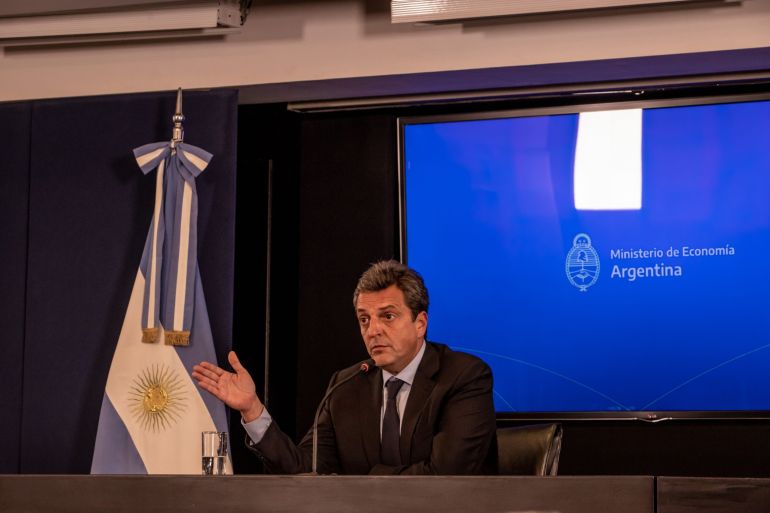Argentina’s new economic minister promises to stop printing money
Printing money fuels inflation which is now over 60 percent in Argentina and expected to reach 90 percent by year end.

Argentina’s new Economy Minister Sergio Massa pledged Wednesday night to stop printing money that helps fuel runaway inflation, outlining his strategy to turn around the country’s deepening crisis.
Massa rolled out his economic roadmap after being sworn in by President Alberto Fernandez as the third such minister in a month. Massa’s measures also focused on boosting exports, reducing the country’s fiscal deficit and increasing the central bank’s dwindling reserves.
Keep reading
list of 4 itemsMartin Guzman: Argentina vs IMF?
Argentina’s central bank raises interest rate to 42.5 percent
Argentina debt: Does IMF offer a path to financial stability?
Massa inherits the enormous challenge of taming inflation that’s now over 60% and expected to reach 90% by the end of this year. Cut off from international capital markets, Fernandez’s government has relied on money printing to cover its chronic fiscal deficit.

“Magic doesn’t exist,” Massa bluntly told reporters in Buenos Aires. “We have to confront inflation with determination.”
The government will finance its budget by reducing its deficit or via private lending. The country is considering four loan offers by three international banks and a sovereign wealth fund, he said, without providing a figure of the potential deal.
Separately, Massa is launching a voluntary local debt swap in pesos for bonds that mature in the next 90 days. He said that there’s already 60% “adhesion” to the swap, without providing more details at the press conference.
The government began discussions with some banks to offer a so-called dual bond to swap securities with maturities under 90 days, according to people with direct knowledge of the matter. Finance Secretary Eduardo Setti offered the dual bond, an instrument in which investors receive the highest rate out of two options at the time of the asset’s maturity. In this case, either an inflation-linked rate or a dollar-linked rate.
A Massa spokesperson didn’t respond to request for comment on the dual bond.
‘Technical Aspects’
Although light on specifics, Massa committed to meeting the government’s primary deficit target this year, a key pillar of its $44 billion program with the International Monetary Fund. Massa said he spoke to IMF staff Wednesday to discuss the program’s future. An IMF spokesperson said in a statement that its staff spoke to Massa about implementing the program.
Investors said Massa needs to deliver more fine print details to assuage market concerns.
“Massa’s speech had a strong political component and some aspirational components but was weak on the technical aspects that the market was demanding,” said Jorge Piedrahita, managing partner at Gear Capital Partners in New York.
It remained unclear how Massa would reduce the deficit while also providing one-time payments to retirees next week as well as “income recovery,” for low-wage private sector workers. He mentioned a “reordering” of social welfare plans focused on getting recipients to return to the job market, including suspending welfare plans for those who don’t participate in a hearing Aug. 15.
“Despite the commitment not to tap additional central bank funding, the measures do little to underpin fiscal credibility, so a fiscal anchor remains absent,” said Ramiro Blazquez, head of strategy at BancTrust & Co. in Buenos Aires. “Bottom-line, implementation details remain scarce.”
Other measures Massa announced:
- New exporting “regimens” for sectors including agriculture, mining, tech and fossil fuel production
- New loan program with loan interest rates for first-time exporters
- Taking legal action against exporters in Argentina and the US for either under-invoicing exports or over-invoicing imports
- Maintaining a previously announced public sector hiring freeze
- Program to create 70,000 computer programmers in 12 months
- Meeting with key leaders of the farm sector known in Spanish as the “Mesa de Enlace”
- Requesting congress pass legislation intended to provide tax relief to various industrial sectors